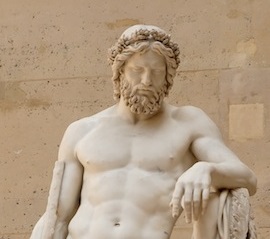Aristaeus
god of bee-keeping, honey-making and olive-growing. He was also the god of herding, cheese-making and hunting.
A minor god in Greek mythology, Aristaeus or Aristaios was the son of Apollo and the huntress Cyrene, who despised spinning and other womanly arts but spent her days hunting. According to Pindar, Apollo spirited her to Libya and made her the foundress of a great city Cyrene in a fertile coastal plain. When Aristaeus was born, Hermes took him to be raised on ambrosia and be made immortal by Gaia.
The Myrtle-nymphs taught him useful arts and mysteries, how to curdle milk for cheese, how to tame the Goddess's bees and keep them in hives, and how to tames the wild oleaster and make it bear olives. Thus he became the patron god of cattle, fruit trees, hunting, husbandry and bee-keeping. He was also a culture-hero and taught humanity dairy skills and the use of nets and traps in hunting, as well as how to cultivate olives.
When he was grown he sailed from Libya to Boeotia, where he was inducted into further mysteries in the cave of Chiron the centaur. In Boeotia he was married to Autonoe and became the father of the ill-fated Actaeon, who inherited the family passion for hunting, to his ruin, and of Macris, who nursed the child Dionysus.
A Delphic prophecy counselled Aristaeus to sail to Ceos, where he would be greatly honored. He did so and found the islanders suffering from sickness under the stifling and baneful effects of the Dog-Star Sirius. Aristaeus discerned that their troubles arose from murderers who were hiding in their midst, the murderers of Icarius in fact.
When the miscreants were found out and executed, and a shrine erected to Zeus, the great god was propitiated and decreed that henceforth the Etesian Wind should blow and cool all the Aegean for forty days from the rising of Sirius. But the Ceans continued to propitiate the Dog-Star, just before its rising, just to be sure. (Hyginus, Poetic Astronomy).
Then Aristaeus, on his civilizing mission, visited Arcadia and settled for a time in the Vale of Tempe. There Aristaeus was chasing Eurydice when she was bitten by a serpent and died. Soon Aristaeus' bees sickened and began to die. He went to the fountain Arethusa and was advised to establish altars, sacrifice cattle and lerave their carcasses. From the carcasses new swarms of bees rose.
Aristeus ("the best") was a cult title in many places: Boeotia, Arcadia, Ceos, Sicily, Sardinia, Thessaly, and Macedonia.
Another story tells that at one time the bees of Aristaeus, son of Apollo, all died of a disease. Aristaeus went to his mother, Cyrene, for help; she told him that Proteus could tell him how to prevent another such disaster, but would do so only if compelled.
Aristeus had to seize Proteus and hold him, no matter what he would change into. Aristeus did so, and Proteus eventually gave up and told him to sacrifice 12 animals to the gods, leave the corpses in the place of sacrifice, and return three days later. When Aristaeus returned after the three days he found in one of the carcasses a swarm of bees, which he took to his apiary. The bees were never again troubled by disease.
[1]













